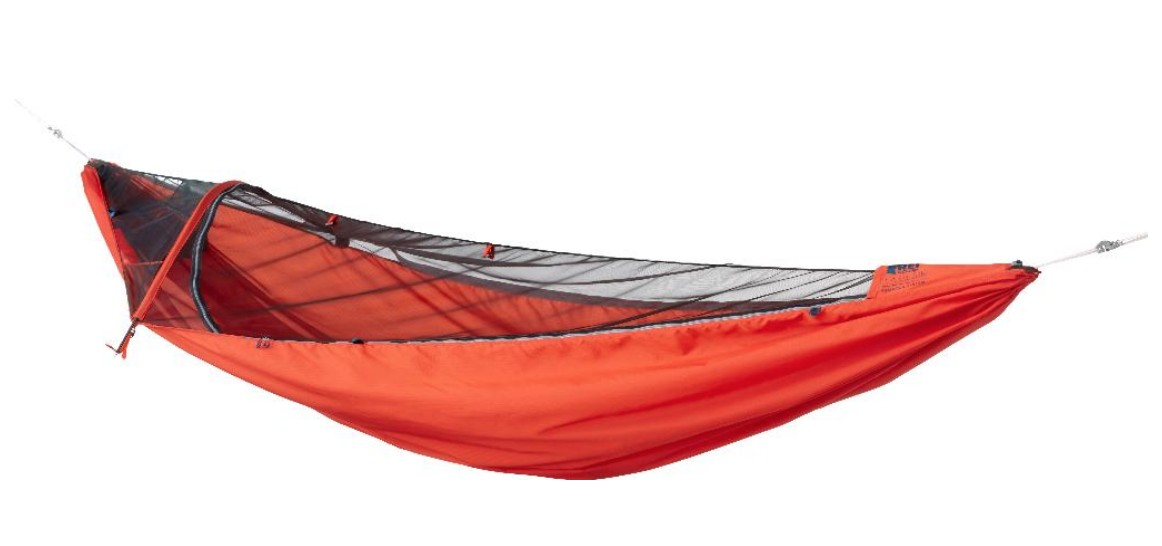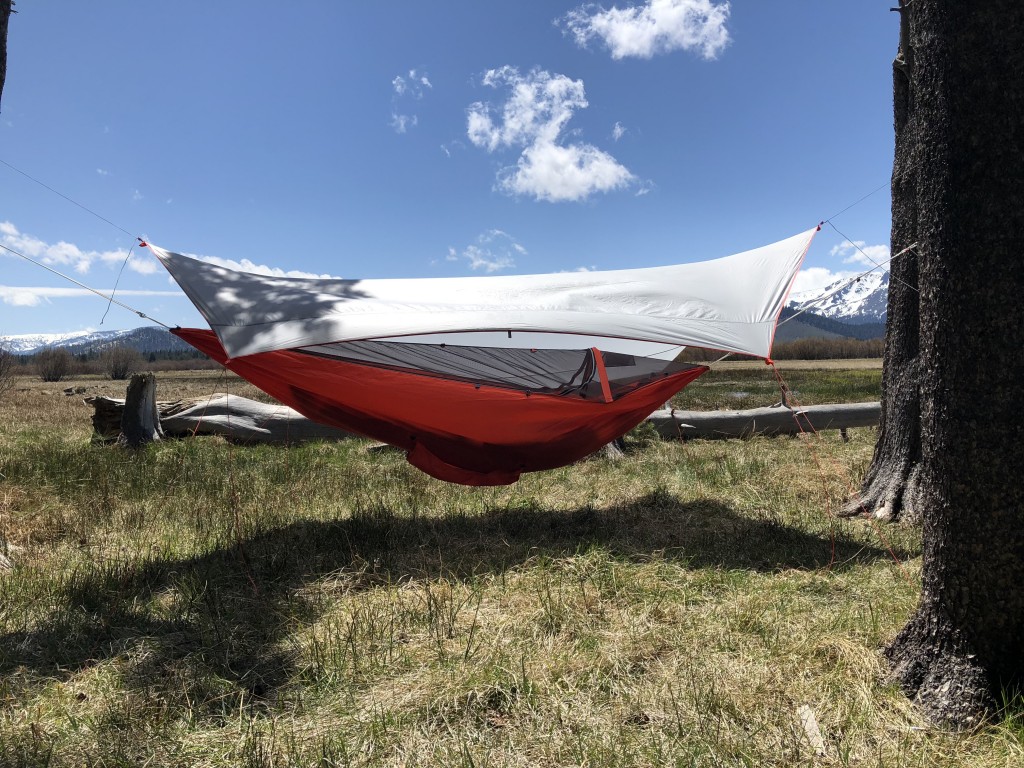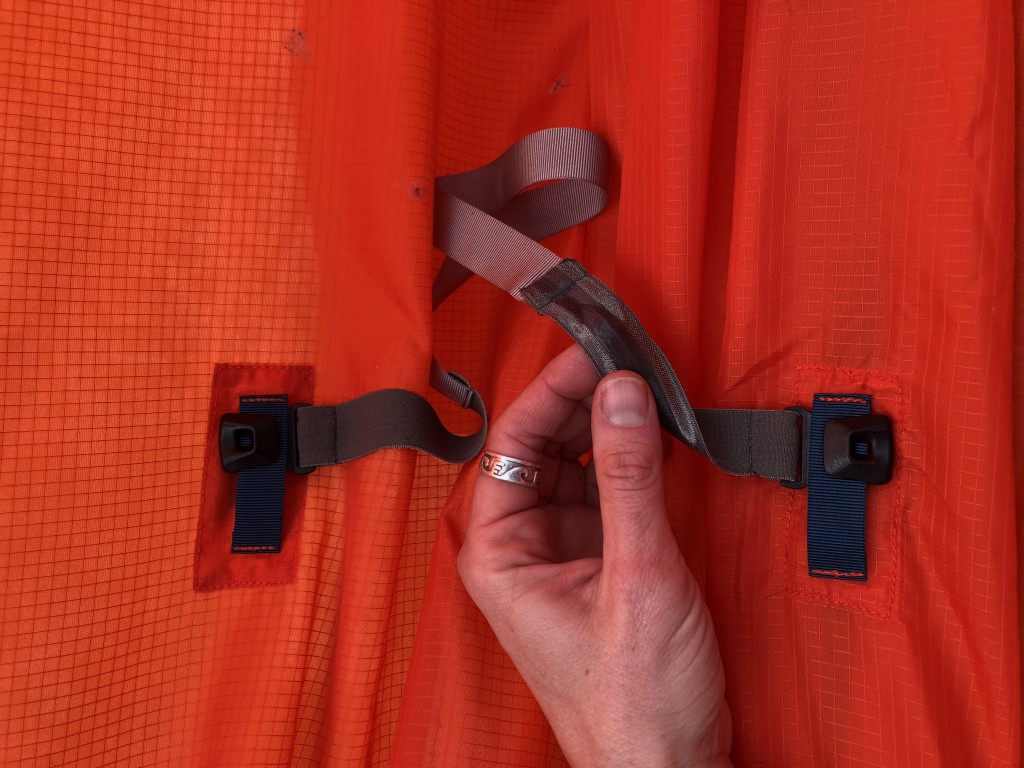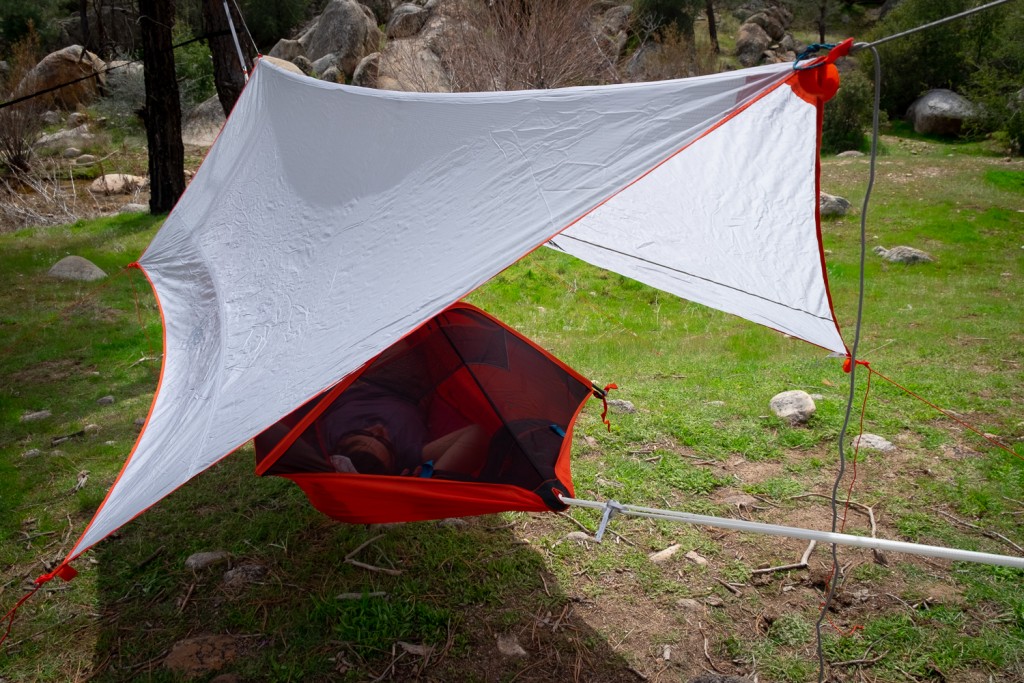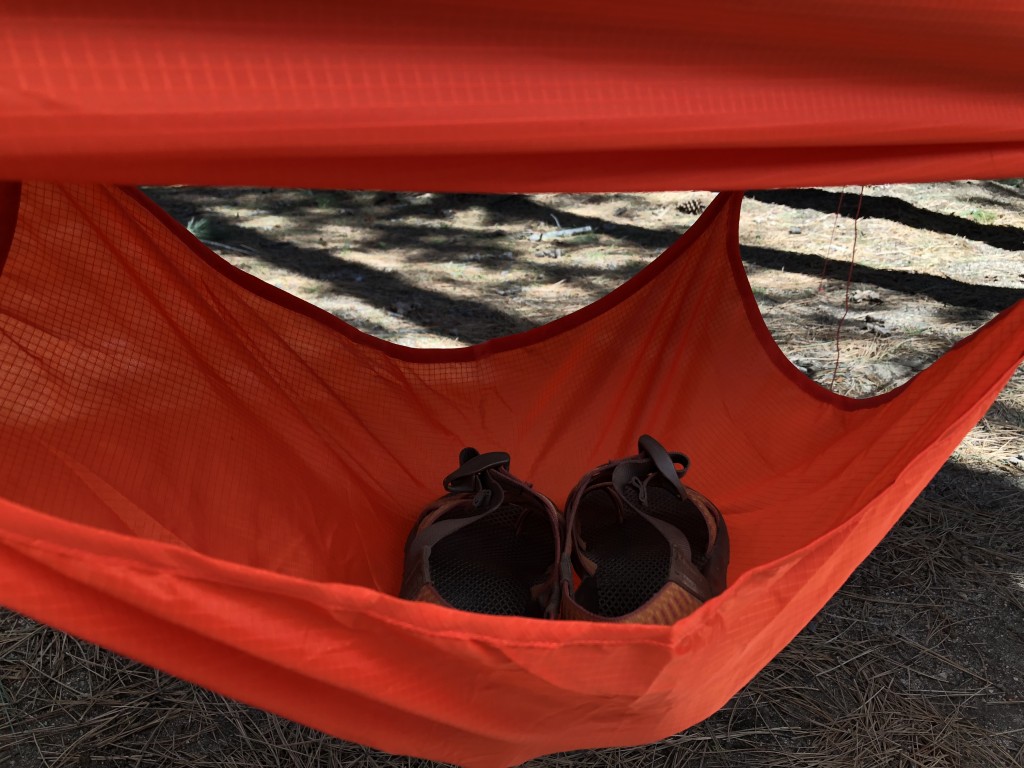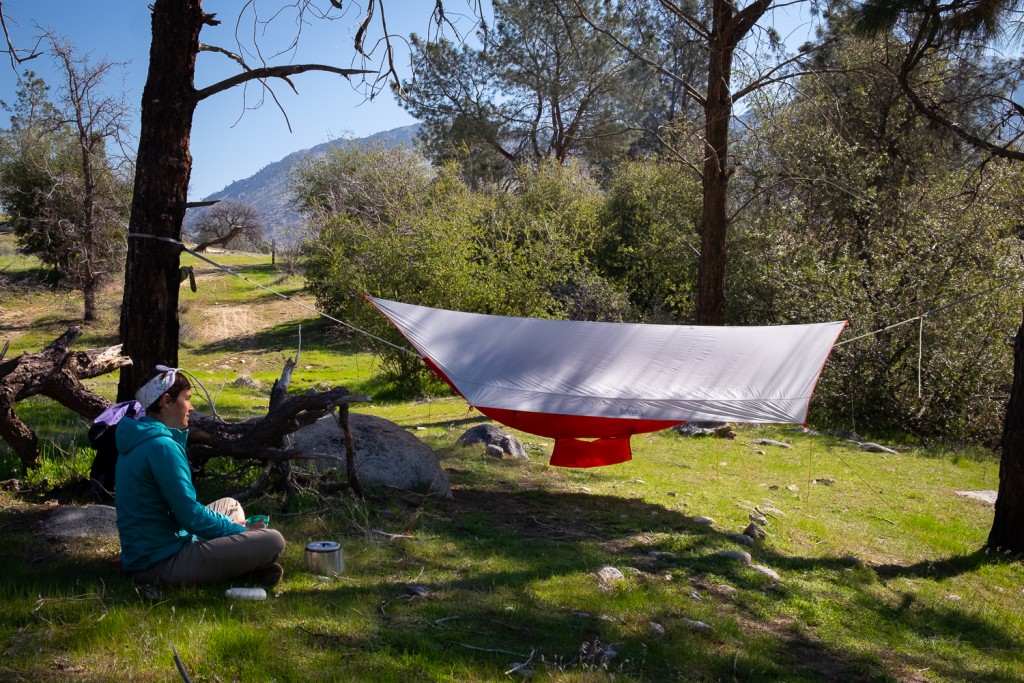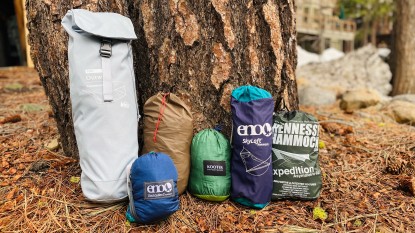REI Co-op Flash Air Review
Our Verdict
Our Analysis and Test Results
Through our years of testing, we have slept in a lot of hammocks. The REI Co-op Flash Air is a unique design focused on cutting weight while offering convenience features and easy setup. It is best suited for shorter campers due to its small design. To see how the REI Flash Air compared, read on!
Performance Comparison
Comfort
The REI Flash Air scores lower in our comfort tests. It's designed for you to sleep end-to-end rather than on the diagonal, making it very hard to achieve a flat position and to avoid hyperextended knees. The sleeping pad straps are a great feature, but because they only hold the pad in position lengthwise, they further inhibit the user's ability to sleep diagonally.
A sleeping pad does help flatten the hammock side to side, giving you more sleeping width, but it can't overcome the end to end curve. A tighter pitch reduces this curve but only so much, and many users will find the curve uncomfortable for a full night's sleep. Without a sleeping pad, shorter users can lay slightly diagonally, but anyone over 5'6" will find their feet confined in the narrowing end of the hammock, which pushes you back off the diagonal.
For shorter folks who prefer to sleep in a curled position, the Flash Air may prove comfortable but the 3.5-foot width and 9.5-foot length are just too small for most to enjoy overnight.
Our testers couldn't sit up in the Flash Air due to its low and tight bug netting. And because of its narrowness, changing clothes inside is an acquired skill that takes a gymnast's flexibility. Nevertheless, it's obvious that REI put great thought into this hammock's design. The small tent-pole-like spreader bar holds the bug netting off your face and creates the perfect amount of tension to keep the netting from dropping or touching you at all. The bug netting can also be rolled up and tucked away in a pocket at the foot of the hammock. This makes it easier to sit up. Even so, sitting around in this narrow hammock is much less enjoyable than in a wider model.
Weight
While this isn't the heaviest complete system we tested, at 44 ounces, it's pretty hefty! At just under three pounds, this system is still lighter than many backpacking tents — until you start getting into ultralight systems, of course. The weight falls right in the range of the other backcountry models we tested but we feel lackluster about the Flash's weight because we expected more coverage or comfort for its 44 ounces. The other systems all offer something more for the same or less weight.
Durability and Protection
The REI Flash Air scored in the middle on our durability and protection tests. A system with a fly and bug net will protect you much better than an open model or even a hammock with only a bug net and no tarp, but the rain fly is smaller than that of most other models. The seams are reinforced and seem quite sturdy though there is more potential for failure as there are more seams in general.
The ends of the hammock have extra material covering the gathering point to keep out the most persistent mosquitos. We also liked that it has corner loops to create easy underquilt attachment points, which can add extra warmth on a chilly or breezy night. The rip-stop material is a nice touch, which is something we only saw in a couple of other hammocks.
The Flash Air's weight capacity is pretty low, at only 250 pounds but a camper weighing more than that is unlikely to find comfort in this smaller hammock system.
The Flash Air also has an integrated ridgeline in the bug net, which helps keep it suspended comfortably above your head. This ridgeline has a break where the zipper that lets you remove the bug net crosses. When the bug net is in use, there's a small plastic clip on the inside just under the zipper to hold the weight of the ridgeline without straining the zipper. While this all makes perfect sense, it also seems like a potential fail point — whether from the strain of use or because it's easy to forget to clip this hidden clasp again when setting up your hammock. If you do decide to use this system, make sure you remember to use this vital piece when the bug net is zipped up! Those minor complaints aside, we are quite pleased with the overall protection and durability of the REI Flash Air.
Ease of Set Up
An involved expedition hammock will never be as easy to set up as a simple clip-and-hang version. However, for a backcountry model, this hammock is pretty straightforward! There are large instructions helpfully printed inside the storage bag, just in case it's been a while since you used it last and you need a reminder.
All the components are included and efficiently organized, to cut down on the amount of time you spend untangling lines or suspension systems. Fly tie-outs have a handy velcro loop to keep them wrapped up and untangled during storage, and there's even a separate pouch inside the storage bag to hold the dirty stakes away from the rest of the hammock! The clips are small (aka weight-saving) and have no moving parts. They slide together at a right angle to attach the hammock to the tree slings. Even the whoopie sling adjustment is reasonably straightforward, with a toggle that's easy to grab and a tag on the line, reminding you how it works.
We found this set-up pretty idiot-proof! It doesn't have a sharp learning curve like some shelters we tested, and the picture directions from REI are undoubtedly more straightforward to follow than Hennessy's wordy written instructions.
One major downside of this system is that the tree slings themselves are relatively short, and can't wrap around even medium-sized trees. Since the slings are attached to the whole hammock adjustment system, you can't just swap them out for longer slings, and REI doesn't sell a longer suspension.
It was also a bit of a mission getting the whole system back into the storage bag when we were ready to pack up and leave camp. It does fit, but narrowly and it requires more time and finagling than any of the other hammock models or systems we tested. With a little extra time and practice, this system isn't significantly more or less work than you'd put into pitching your average tent.
Versatility
For an expedition-style hammock, the Flash Air retains a decent amount of versatility. Being able to roll the bug net and tuck it away allows you to sit sideways fairly comfortably. Importantly, the zipper attaching the bug net is double-sided, meaning you can set up this system to open on the right or left side, to match the zippered side of your sleeping bag.
There are also a lot of little loops and pockets on the Flash Air, for hanging underquilts, small towels to dry, or other light gear items. Five small interior pockets help you to stay organized inside this hammock. We liked being able to put a headlamp in the pocket above our head to read at night, then placing our book into the more substantial pocket to fall asleep. The Flash Air also has an undersling for larger gear. We liked using it as a place to store our shoes at night to keep out the nighttime stalkers (think spiders and scorpions!). Unfortunately, you can only use it if you don't have an underquilt.
Value
Other total systems can cost tens or hundreds of dollars more when you start adding in bug nets, rain flies, ridgelines, stakes, lightweight carabiners, and underhanging storage — all of which come standard with the REI Flash Air. However, we found another model in our test offering a full set up for a similar price that is significantly more comfortable and no heavier.
Conclusion
The Flash Air is a well-designed hammock with a super-easy setup and many convenience features to keep your gear organized but in the end, it lacks the comfort needed for most folks to get a good night's sleep. If you're under 5'8" you may find the Flash to be perfect, but larger and taller folks are just not likely to enjoy the confined space.


